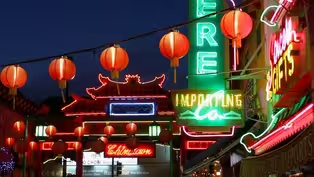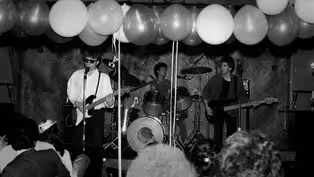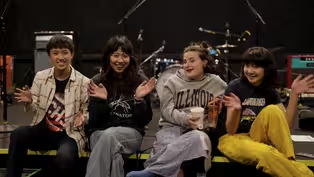
Madame Wong's and Hong Kong Cafe's Flyer Wars
Clip: Season 14 Episode 1 | 8m 13sVideo has Closed Captions
Find out how Hong Kong Cafe and Madame Wong's rivalry spilled into the newspapers.
At the height of their legendary turf war, Hong Kong Café and Madame Wong's used unconventional business tactics — from cheeky newspaper ads to cassette tape pranks. The fued between the two concert venues made headlines in major publications like Billboard Magazine and L.A. Weekly, sparking national curiosity for Chinatown's punk wars — an unforgettable chapter in L.A. punk music history.
Problems playing video? | Closed Captioning Feedback
Problems playing video? | Closed Captioning Feedback
Artbound is a local public television program presented by PBS SoCal

Madame Wong's and Hong Kong Cafe's Flyer Wars
Clip: Season 14 Episode 1 | 8m 13sVideo has Closed Captions
At the height of their legendary turf war, Hong Kong Café and Madame Wong's used unconventional business tactics — from cheeky newspaper ads to cassette tape pranks. The fued between the two concert venues made headlines in major publications like Billboard Magazine and L.A. Weekly, sparking national curiosity for Chinatown's punk wars — an unforgettable chapter in L.A. punk music history.
Problems playing video? | Closed Captioning Feedback
How to Watch Artbound
Artbound is available to stream on pbs.org and the free PBS App, available on iPhone, Apple TV, Android TV, Android smartphones, Amazon Fire TV, Amazon Fire Tablet, Roku, Samsung Smart TV, and Vizio.
Providing Support for PBS.org
Learn Moreabout PBS online sponsorshipWhen the Hong Kong was in full swing, there were lines around the block and there were lines at Madam Wong's too.
Both venues were very small, so it was always packed in front of the stage.
And Hong Kong, there were no chairs or tables and everybody was right up on the stage.
And at Madame Wong's the tables were there in front of the stage and everybody would sit and have their cocktail and listen politely to the bands.
We were just a stone's throw away from Madam Wong's.
We could see Madam Long standing in her window looking at us and she could see everything going on inside of our club and she'd be going like this, you know, It's a pair of binoculars looking into the club.
We started getting rumors that Esther Wong, Madame Wong's was threatening her bands.
Madame Wong's had told anybody that if you play over there, you'll never play here again.
That's what started everything.
The first gig that the Tech Stones played was at the Hong Kong Cafe, and then we were going to get booked to play Madame Wong's.
But when she found out that we were booked at the Hong Kong, Madam, Wong says, No, you're not playing my club.
So she canceled us the night we were going to play.
So we went down there with our guitars on and stood in front of her staircase and picketed her place when she started telling people they couldn't play her club.
I figured, I'm going to have to pick up on this and use it.
I know she didn't like us, but we took advantage of that.
The war started when we started doing our advertising.
That's when it started because she would have an ad in the L.A. Weekly.
It would say Madame Wong, the first and finest in Chinatown.
And we thought that was kind of funny.
So the next week we came out and we said the biggest and the best Hong Kong cafe.
I changed the address of the club in our advertising.
We're located in the heart of Chinatown at 425 Gin Lin Way.
I changed that to e're located in the heart of Chinatown, just a few doors away from what's her name Then she started outlining her ad.
The border around her ad had names of groups that played her club.
So Madam Wong's ad would say, ome of The Police, The Motels, 20/20, John Hiatt, The Know.
I copied the ad exactly, and I put different names.
I used Frank Sinatra, Liberace, Lawrence Welk, Cher, Bob Hope, Tony Bennett, Sammy Davis, Jr. We didn't advertise those people played in the club.
We just put them on our ad Madame Wong would call the fire department because we were packed.
She used to complain our club was only supposed to hold 200, 250 people.
And on a big night we put in there maybe 400.
It was way overcrowded.
Yes, The fire department was there one night when Fear was playing.
They came in to the club and closed it down.
Fire people were there all the time, but they would watch the show and they loved the show and they loved the bands.
There was a time when she would be really quiet and I knew how to rile her up.
We looked and saw that Dwight Twilley was going to be playing at Madame Wong's, and it was also the same day that his new record was being released.
Wow.
There went light bulb.
So we went to Tower Records on Sunset and bought his new cassette tape.
In those days, Madame Wong's played tapes between bands.
So we take the Dwight Twilley tape and we carefully open up the cellophane, take the tape out, and you know it's tape, so you can record over that.
We went to the second cut and we covered the little hole on top of the tape, and I have a friend named Kenny, and Kenny used to do this disc jockey kind of thing.
We wrote up a little spiel and Kenny recorded onto a cassette player, a little advertisement for the Hong Kong Cafe.
Susie made arrangements for a courier to deliver this tape to the sound man at Madam Wong's, and he's going, Wow.
Dwight Twilley Wow, this is great.
I'm going to slam this right into that cassette player and play it during the first break.
So of course he did that and in breaks Kenny with this big commercial for the Hong Kong.
It's loud.
Hey, listen, kids, come on down to the Hong Kong Cafe.
Don't delay after being at whats-her-name, you want to be there anyway.
He did a whole ad for Hong Kong Cafe with the music blaring behind.
Yeah, the Hong Kong Cafe.
And Madam Wong was just fuming.
She was really upset.
She got so mad and everybody thought it was so hip that they started writing about it, about the bands and the protesting.
We had a lot of coverage from the L.A. Times, from the L.A. Weekly.
Billboard magazine ran a story.
We had press you couldn't buy.
The Hong Kong became really famous really fast.
And that Madame Wong... She hated us.
They called it the Wanton Wars, and they played it up.
They really played it up big.
Somebody from Bam magazine came up with it, and then they also called it the Chinatown Syndrome.
Of course, they would use titles like The Won Ton Wars.
Gets you to read it, first of all, and it makes the reader feel superior to these Asian owned businesses in Chinatown and also to these punkers or new wavers that aren't playing the established music.
Theyl just belittle it from every angle because to them it's funny, right?
It's a very racialized term.
Because won ton is a food and a you are using a kind of food to describe some business disagreements.
The wars were not about these two restaurants.
It was really about fans, musicians from different genres.
And if you want to align with a certain type of music, you go to a certain venue.
There's a lot of people who went to Madame Wong's that wouldn't go to the Hong Kong Cafe and serious punk people looked down their nose a little at Madame Wong's.
Both places were popular, but the audiences were different.
You kind of see the difference in the way people dress and the way they express themselves.
The punks were all punked out in their outfits.
They were wearing safety pins, creating their own clothes.
The hair was spiked up.
And then the new wave crowd.
The guys would wear skinny ties.
The girls, you know, big baggy bellbottom pants and platform shoes.
In between shows, people would be hanging out so you'd have a clutch of safety pins over there.
And the clutch of the skinny ties over there.
As more people got into it, then they all started choosing sides.
There was the hardcore guys who hated the skinny tie guys and the skinny tie guys hated the punk rocks.
We couldn't get a gig at Madame Wong.
So I decided, okay, we'll go and we'll stand in front of our office.
And then she talked to us and firmly kind said, o, you're never going to play here So when we got the call to do the Hong Kong, it was like, yeah.
Yeah, screw Madam Wong's, you know, which was kind of the attitude.
She was a tough cookie.
She knew what she wanted.
If she didn't like you, that was it.
She made real business decisions and one of those business decisions was not letting those punk bands play.
Because of that, Esther Wong was characterized as a dragon lady.
It is denigrating because Dragon Lady is a trope.
It's a persistent trope about Asia, about Asian women and being a dragon lady It's not just about being a bossy, determined woman.
If you look at Esther, she can be bossy, right?
But was doing that for very different purposes than what others assumed.
What she wanted to do wasn't what the Hong Kong Cafe was doing was actually good, that she set up this rivalry between the two clubs.
It added some energy, you know, to the whole scene.
I don't know what actually thought of the music, whether she actually liked any of it at all, but I know she certainly appreciated what it was bringing to the club.
Video has Closed Captions
Preview: S14 Ep1 | 40s | Two Chinese restaurants became the unlikely epicenter of L.A.’s burgeoning punk scene. (40s)
How L.A.’s Chinatown Became a Tourist Destination
Video has Closed Captions
Clip: S14 Ep1 | 2m 35s | Learn more about the rich, centuries-long history of L.A.'s Chinatown. (2m 35s)
Linda Lindas on Chinatown Punk, Influences, and Identity
Video has Closed Captions
Clip: S14 Ep1 | 2m 48s | The Linda Lindas sit down to talk about Chinatown punk, influences, and identity. (2m 48s)
Providing Support for PBS.org
Learn Moreabout PBS online sponsorship

- Arts and Music
The Best of the Joy of Painting with Bob Ross
A pop icon, Bob Ross offers soothing words of wisdom as he paints captivating landscapes.












Support for PBS provided by:
Artbound is a local public television program presented by PBS SoCal



